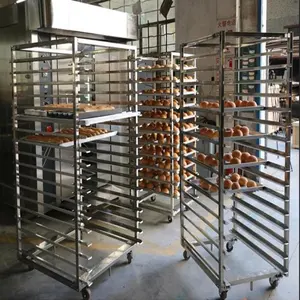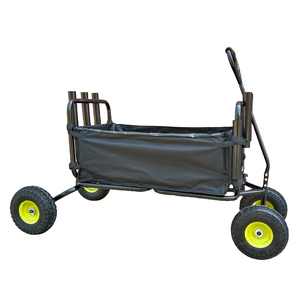(119239 products available)










































































































































































































Metal trolleys come in different configurations, each designed for specific applications. The structure of metal trolleys is usually derived from steel or aluminum alloys to combine strength and lightweight properties. Below are prevalent types of metal trolleys employed in various settings.
Folding trolleys are designed with collapsible features for convenient storage and transport. Normally, these trolleys have a foldable base and a handle that can be tucked away when not in use. Many folding trolleys are manufactured with light but durable alloys for easy carry and storage in cars or small spaces. Such trolleys are applicable in situations that require transportation, such as warehouses, retail, and events.
A heavy-duty metal trolley provides support for colossal weights and is ideal in industries and warehouses. Constructed from robust steel, these trolleys have fortifications to manage large protocols or equipment. Many of them feature additional strengthening wheels for smooth functioning when carrying heavy objects. Their application is general in settings that require heavy loads to be manoeuvred, such as manufacturing and construction.
A cage trolley has a protective cage, offering extra security for products when transported. This trolley comes in handy when dealing with items that need to be secured or monitored during shipment. The caging is either constructed with wires or sheet metals to avoid easy theft or damage. Frequent applications of this trolley are in retail, logistics, and warehousing.
Platform trolleys have a flat table surface for piling goods and easily moving them from one place to another. These trolleys do not have sides, which allows simple loading and off-loading of items. Constructed from steel or aluminum, platform trolleys can remain lightweight or strong, depending on what is needed. They are usually applied in industries, warehouses, and retail.
Metalliferous tool trolleys are intended for use in workshops and garages to organize tools and equipment. These trolleys usually have different compartments, drawers, or trays for easy access and arranging tools. Constructed mainly from steel, tool trolleys are robust and intended for constant use. Often, they find application across mechanics, manufacturing, and construction domains.
Metal trolleys are normally intended to be robust, durable, and frequently required in different settings. They are most times constructed from steel or aluminum alloys and possess properties of robustness, resistance to rust, and resistance to easy wear and tear.
The durability of metal trolleys is crucial, especially in demanding settings where they manage heavy weights regularly or face exposure to different environments. Trolleys that are made from steel alloys offer superior strength and are suitable for heavy-duty tasks. Aluminum trolleys, on the other hand, provide lightweight features and high resistance to rust, making them suitable for outdoor or humid conditions.
Maintenance is necessary to keep metal trolleys working properly and extend their lifespan. Metal trolleys need maintenance as follows:
Regular cleaning
The cleaning of metal trolleys should be carried out routinely so that any debris or residue that has accumulated will not cause deterioration. The best cleaning method is the mild soap and water method, which ideally should be used daily. Cleansers with abrasive contents and strong chemicals should be avoided since they easily damage the finish of the trolley and cause corrosion, especially on aluminum trolleys.
Lubrication
By frequently lubricating the wheels and any movable part, it becomes possible to minimize the friction associated with such systems, thus prolonging their life. Trolleys should be serviced with suitable lubricating products such as oil or grease as the manufacturer targets the mechanism. Poor lubrication causes rust, and Therefore, it is ideal to avoid using water as a lubricant.
Rust prevention
Even though materials like stainless steel are used in most metal trolleys to ward off rust, it may still occur at some point. Applying a wax coating on the chassis or using anti-rust spray will assist in protecting the trolley within a damp surrounding or near water. For exposed areas, checking and cleaning them regularly will encourage a longer life span.
Inspection
Regular inspections are adequate for identifying defects, particularly those like bent wheels or loose connections. Reports should be given based on how items are used so replacement or repair can happen before a malfunction does. During inspection, it is good practice to observe if there are any signs of rust or corrosion and treat them accordingly.
Proper storage
Trolleys should be stored in dry areas to minimize exposure to humidity, which causes rust. When the trolley is stored inappropriately, it folds away or is kept without any object lying on it; this will also preserve the integrity of its structure and wheeled mechanism.
Metal trolleys have numerous customization options, making them ideal for specific needs or preferences. Whether the requirement comes from branding, functionality, or space limitations, various customizations can be made to suit the need.
One of the first and foremost customization aspects offered is the load capacity. For certain applications, trolleys must be fitted with stronger platforms or more robust materials to handle heavier weights. In contrast, for lighter applications, more petite and lightweight designs can be employed. Specific industries that demand distinct load capacities, such as construction or food processing, apply special request load ratings.
Customization on wheels is significant since it directly impacts mobility and usage flexibility. Various wheel materials and sizes can further optimize performance, including pneumatic wheels for shock absorption or polyurethane for durability and quiet operation. Caster configuration can also be customized to offer a fixed or swivel approach, which will make it easier for the trolley to operate in particular spaces.
The handle on metal trolleys can be customized into various styles, such as folding, fixed, or ergonomic. This is done to ensure that the handle is related to the user's comfort and functionality, as the design is more comfortable for grip and control. Also, different height variations are available to will make the handle fit any user height or application.
The finish and color of metal trolleys are usually adjusted to align with the branding of a company or the aesthetics of a facility. Powder coating, chrome plating, or galvanized finishes are standard adjustments for enhancing corrosion resistance and providing a smooth, shiny appearance. Color personalization makes it possible for the trolley to be in uniformity with the patterns of a particular corporation or for the purposes of categorizing objects.
Additional trays, side extensions, or handles for attachments can easily be added to metal trolleys to increase their functionality. Such custom attachments are practical for carrying more items or affording the user additional support while moving products. These extensions generally find use in warehouses, hospitals, and kitchens.
For retail or hospitality applications, branded features such as company logo or specific colors can be added to the trolley to promote the brand. This adjustment is popularly used in marketing to enhance brand awareness within a certain environment.
When a metal trolley is required, there are some critical factors to look into that help in making a fitting choice for intended tasks. A detailed understanding of the desired application helps align the trolley specifications with needs and ensures efficiency and durability in the operation.
Some of the key things to consider when choosing metal trolleys include the following:
Load capacity
The primary consideration with any trolley is whether it can handle the projected load weight. This is vital in determining which type of trolley to use: a heavy-duty folding, a platform, or a cage. Overloading a trolley can make it unsafe and reduce its lifespans; thus, choosing one that has the proper load rating is important.
Material and construction
Trolleys can be made of steel, aluminum, or stainless steel. Steel made is the most durable and is fit for heavy-duty applications, while aluminum is lightweight and rust-proof, mostly used for outdoors or humid environments. Metal trolleys made with stainless steel are excellent in resisting corrosion, especially when in contact with chemicals.
Wheel type
The different available wheel types will affect the manoeuvrability of the trolley, especially on different floors. Caster material, such as polyurethane or rubber, offers varying degrees of noise levels, durability, and shock absorption. Furthermore, the wheel size and caster configuration (swivel or fixed) greatly influence cornering and straight movement.
Usage environment
The conditions inside which the trolley will be used are an important factor in customizing them. For outdoor use or environments where moisture is common, rust-resistant materials, such as aluminum or stainless steel, should be utilized. For harsh chemical environments, a finish like powder coating or a galvanized coat will add to protection.
Design and features
Away from the handle and wheel features, others that need to be considered include additional platform depths, side rails, and handle styles. Folding handles provide storage space, whereas fixed ones offer grip for control. Other features such as brakes and push/pull handles can equally impact functionality.
Budget
While there is no doubt that the price will feature amongst the factors that influence the choice of metal trolley, it is necessary to ensure value. Although some cheaper alternatives may be available at the onset, coming with lower costs, high-quality trolleys are likely to pay off in increased safety, durability, and efficiency. Under very high usage conditions, investment in a premium trolley constructed from quality materials can lead to considerable savings in the long run.
A1: Yes. Metal trolleys can be designed to handle specific weights or to ensure versatility for various loads.
A2: Steel offers superior strength and is ideal for heavy-duty use, while aluminum is lightweight and rust-resistant, suited for outdoor use.
A3: Applying anti-rust coatings like powder coating or galvanizing can extend the life of metal trolleys by protecting them from rust and corrosion.
A4: Different wheel types, including rubber, polyurethane, and pneumatic, impact mobility, especially over various terrains and loads.
A5: Yes, metal trolleys can be customized with company colors, logos, and other branding elements for promotional purposes.